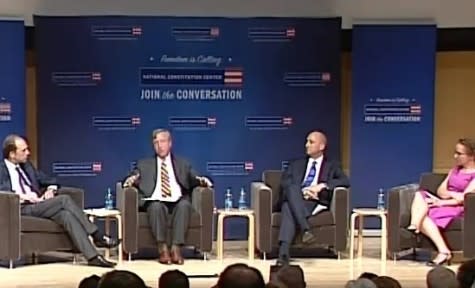Video: A constitutional conversation about Gettysburg
Recently, four acclaimed Civil War experts from the popular New York Times “Disunion” blog talked about the Battle of Gettysburg in front of a sold-out audience in Philadelphia. And the topic of constitutional issues came up.
gettysburg panel
Ted Widmer, Sean Wilentz, Judith Giesberg, and Adam Goodheart talked about the epic battle iat the National Constitution Center in June.
The authors appeared in conjunction with the release of their new book, and these insightful historians provided social and political context for understanding the pivotal Gettysburg battle and the turmoil in America circa 1863.
You can watch the full video of the 70-minute discussion, with an introduction by the Center’s Jeffrey Rosen, below.
“Throughout the Civil War, of course, the Constitution is being tested, and bent and violated. And studied with great care, including by the president of the United States who in many ways rises to national prominence with his Cooper Union speech [in 1860], which is a very close examination about what the Founding Fathers thought about this vexing question of slavery,” said Widmer.
Another issue, still being debated today by some people, was the constitutional right of the southern states to leave the Union.
One audience member asked if the South Carolina and other states really violated the Constitution by seceding.
Sean Wilentz gave some background on the issue of secession, which was a problem well before the Civil War. He pointed out that President Andrew Jackson crushed the idea of secession during the nullification crisis of the early 1830s.
Wilentz pointed to a famous proclamation from Jackson in 1832 that made his thoughts quite clear.
“The Constitution of the United States, then, forms a government, not a league, and whether it be formed by compact between the States, or in any other manner, its character is the same,” Jackson said.
“The laws of the United States must be executed. I have no discretionary power on the subject–my duty is emphatically pronounced in the Constitution,” Jackson said. “Those who told you that you might peaceably prevent their execution, deceived you–they could not have been deceived themselves. They know that a forcible opposition could alone prevent the execution of the laws, and they know that such opposition must be repelled. Their object is disunion: but be not deceived by names: disunion, by armed force, is TREASON.”
The Supreme Court settled the secession issue in 1869 in the case of Texas v. White.
Wilentz said in 1860 and 1861 the Confederates didn’t think they were violating the Constitution, but they were also making war against the country whose Constitution they had been under.
Adam Goodheart added that as America was celebrating the Fourth of July as the dead and wounded were lying on the field of Gettysburg, southern states set off fireworks because they saw themselves as celebrating the legacy of the Founding Fathers, too.
The difference between 1776 and 1861, Goodheart said, was that the Founding Fathers weren’t part of a governing compact. In 1861, there was a compact the southern states they had been part of.
Goodheart also said that the Congress of the United States was a northern Congress since the southern states had left. Congress did a lot to press forward the issue of emancipation, independent of President Lincoln (and sometimes hand in glove with him).
More Gettysburg Coverage
Read six different versions of the Gettysburg Address
Did Abraham Lincoln omit God from the Gettysburg Address?
Video: Life on the eve of the Battle of Gettysburg
Judith Giesberg said the fallout from the Emancipation Proclamation after January 1863 was mixed.
In Pennsylvania some areas were asking the state government to pass “black codes” to prevent blacks from entering the state, Giesberg said. The state House did, but the state Senate didn’t. Petitions also asked for laws against interracial marriage.
“It gives you a sense about what some Pennsylvanians thought,” Giesberg said.
“During the Civil War itself, many people didn’t see the full metaphorical potential of the Battle of Gettysburg,” Goodheart added. “It almost immediately became a tourist spot for northerners because it was accessible by train.”
And things could have been quickly different, if General Robert E. Lee had been successful at Gettysburg, the experts pointed out.
It was Union troops from Gettysburg who went sent to quell mass draft riots in New York City just a few weeks after the battle. If Lee’s army had remained in Pennsylvania, the combination of the Confederate presence and the popular unrest in New York would have created a different political climate.
Part 1: The Eve Of Gettysburg
Part 2: The Eve Of Gettysburg
Part 3: The Eve Of Gettysburg


